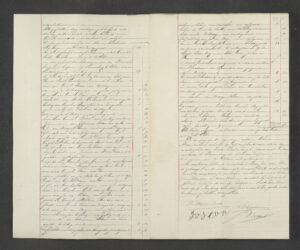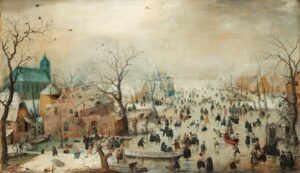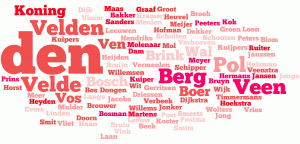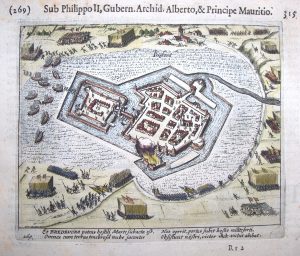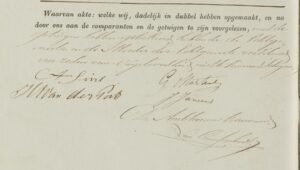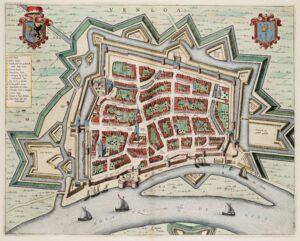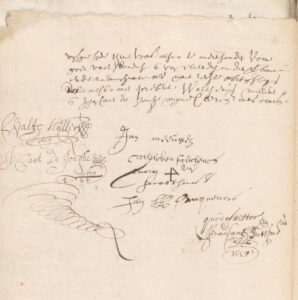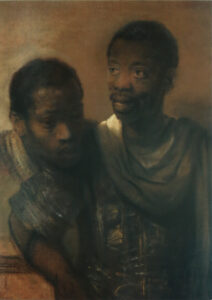If you are looking for notarial records, be sure to check in neighboring towns too. Unlike civil registrations or court records, there was no requirement to go to the notary in your own town. Sometimes, people lived in the countryside and the notary of a neighboring town was more convenient. Your ancestor could also appear in notarial records in another town if the seller or purchaser lived elsewhere and created the record there. When looking for notarial records of my ancestors Martinus … [Read more...]
Dutch term – Winter
The Dutch word winter means the same in English: winter. Wintertime was traditionally the time to do indoor activities, such as finishing wooden shoes, weaving, making mats, etc. In many parts of the Netherlands, it was hard to get around in the winter since the roads were too boggy. As soon as it was cold enough for the ice to become reliable, many people used frozen creeks to get around, either on skates or on sleds. … [Read more...]
Quick tip – “De” Names do not mean Huguenot
The prefix "de" in a name can be confusing. It means "the" in Dutch but can also mean "de" in French. People who have done Huguenot research often assume a "de"-name indicates a French or Huguenot origin. But when you're dealing with a Dutch family, think horses not zebras: your Dutch ancestor with a "de" name was probably Dutch. The most popular Dutch "De"-names are: De Vries [the Frisian] De Jong/Jonge [the younger] De Boer [the farmer] De Groot [the great/tall] De Wit … [Read more...]
Dutch term – Voornoemd
In records, you sometimes see a reference to someone, "voornoemd." That means "aforesaid," the same person as mentioned before. For example, the beginning of the record may introduce Jan Jansen as the guardian of Janna Derksen. Further on in the record they may refer to "Jan Jansen, voornoemd," which refers to the Jan Jansen that was already introduced. … [Read more...]
Quick tip – Who was the previous owner?
When you hit a brick wall and the ancestor whose parents you're looking for owned property, try and find out who owned the property previously. The previous owner may have been related, if the ancestor inherited the property, or may have created a sale or conveyance record that mentions your ancestor. For an example of how useful tracing the previous owner can be, read my article "Griete Smith's Parentage: Proof in the Absence of Vital Records" (PDF) as it appeared in the December 2016 issue … [Read more...]
Dutch term – Verklarende niet te kunnen schrijven
In civil registration records, the informants of birth and death records and the bride and groom and their parents in marriage records, as well as the witnesses, are asked to sign the record. If the people were illiterate, this will be noted in the final sentences of the record. Often you will see a sentence like "verklarende de moeder van de bruidegom uit hoofde van ongeleerdheid niet te kunnen schrijven" [the mother of the groom declares not to be able to sign, as not having learned … [Read more...]
Dutch Genealogy News for November 2020
Here are new websites and sources that were announced last month. Sources The Historisch Centrum Overijssel has digitized several Overijssel notarial records 1836-1925. The scans are now available via the finding aid. The contemporary indexes ("repertoires") of the notarial records from The Hague (1843-1935) have been scanned and are available online via the finding aid. The notarial records themselves can be ordered via free scanning-on-demand after January 1st, 2021. The Amsterdam … [Read more...]
Quick tip – Was there a prenuptial agreeement?
In some cases, couples made a prenuptial agreement when they married. Often, this was the case when at least one of the spouses had assets to protect, or when one of the spouses was richer than the other. The typical arrangement was that if one of them died without children, that person would receive a sum of money while the survivor kept the rest. The sum reflected each spouse's financial situation at the start of the marriage. Another reason to make a prenuptial agreement is if one or both of … [Read more...]
Eight Dutch Naming Patterns to Watch Out For
Understanding how Dutch people named their children or themselves will help you solve your family mysteries. Here are eight Dutch naming patterns to watch out for. Naming children after grandparents Many Dutch children were named after their grandparents, often in a specific order: the first son after the paternal grandfather, second son after the maternal grandfather, first daughter after maternal grandmother, second daughter after paternal grandmother. After the grandparents were named, … [Read more...]
Video – Black in Rembrandt’s Time
Museum Rembrandthuis created an exhibition "Black in Rembrandt's time." Rembrandt portrayed several black people in his paintings and drawings. The museum has brought these portraits together. This video gives a virtual tour of the exhibition. Closed captions are available in English. https://www.youtube.com/watch?v=yTRI161zY_g … [Read more...]
